Smart Tire Market
Smart Tire Market Size and Share Forecast Outlook 2025 to 2035
Smart tire market is projected to grow from USD 1.8 billion in 2025 to USD 4.6 billion by 2035, at a CAGR of 9.8%. Pressure will dominate with a 40.0% market share, while passenger will lead the vehicle segment with a 60.0% share.
Smart Tire Market Forecast and Outlook 2025 to 2035
The global smart tire market is projected to reach USD 4.6 billion by 2035, recording an absolute increase of USD 2.8 billion over the forecast period. The market is valued at USD 1.8 billion in 2025 and is set to rise at a CAGR of 9.8% during the assessment period.
The overall market size is expected to grow by nearly 2.6 times during the same period, supported by increasing demand for connected vehicle technologies and advanced tire monitoring systems worldwide, driving demand for specialized sensor technologies and increasing investments in automotive safety initiatives and intelligent transportation systems globally. However, complex integration requirements and technical challenges in large-scale commercial vehicle applications may pose obstacles to market expansion.
Quick Stats for Smart Tire Market
- Smart Tire Market Value (2025): USD 1.8 billion
- Smart Tire Market Forecast Value (2035): USD 4.6 billion
- Smart Tire Market Forecast CAGR: 9.8%
- Leading Sensor Type in Smart Tire Market: Pressure
- Key Growth Regions in Smart Tire Market: Asia Pacific, Europe, and North America
- Top Players in Smart Tire Market: Bridgestone, Michelin, Goodyear, Continental, Pirelli, Sumitomo Rubber, Yokohama, Hankook, Nokian, Sensata
- Smart Tire Market Year-over-Year Forecast (2025-2035)
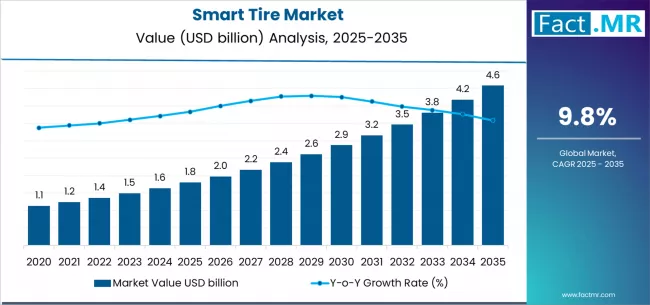
Between 2025 and 2030, the smart tire market is projected to expand from USD 1.8 billion to USD 2.9 billion, resulting in a value increase of USD 1.1 billion, which represents 39.3% of the total forecast growth for the decade. This phase of development will be shaped by rising demand for automated vehicle monitoring solutions and advanced tire management technologies, product innovation in pressure monitoring systems and temperature sensing platforms, as well as expanding integration with commercial vehicle fleet management systems and automotive safety applications. Companies are establishing competitive positions through investment in specialized sensor manufacturing capabilities, advanced connectivity technologies, and strategic market expansion across passenger vehicle, commercial vehicle, and specialty automotive applications.
From 2030 to 2035, the market is forecast to grow from USD 2.9 billion to USD 4.6 billion, adding another USD 1.7 billion, which constitutes 60.7% of the overall ten-year expansion. This period is expected to be characterized by the expansion of specialized automotive applications, including advanced embedded sensor systems and next-generation monitoring solutions tailored for specific vehicle requirements, strategic collaborations between tire manufacturers and automotive technology companies, and an enhanced focus on vehicle safety standards and automated monitoring protocols. The growing emphasis on connected vehicle technologies and intelligent transportation systems will drive demand for comprehensive smart tire solutions across diverse automotive applications.
Smart Tire Market Key Takeaways
| Metric | Value |
|---|---|
| Market Value (2025) | USD 1.8 billion |
| Market Forecast Value (2035) | USD 4.6 billion |
| Forecast CAGR (2025-2035) | 9.8% |
Why is the Smart Tire Market Growing?
The smart tire market grows by enabling automotive manufacturers and fleet operators to optimize vehicle performance while accessing specialized sensor technologies without substantial in-house infrastructure investment. Automotive companies and fleet management operators face mounting pressure to develop automated monitoring systems and advanced safety solutions while managing complex operational requirements, with specialized smart tire technology typically providing 40-60% improvement in tire performance monitoring compared to conventional alternatives, making advanced sensor technologies essential for competitive automotive positioning. The automotive industry's need for safety standards and application-specific monitoring capabilities creates demand for comprehensive tire solutions that can provide superior performance data, maintain consistent operational quality standards, and ensure reliable monitoring without compromising vehicle performance or operational effectiveness.
Government initiatives promoting connected vehicle technologies and intelligent transportation systems drive adoption in passenger vehicle development, commercial fleet operations, and specialty automotive applications, where monitoring quality has a direct impact on vehicle safety and long-term operational effectiveness. However, system complexity constraints during large-scale vehicle integration projects and the expertise requirements for specialized sensor implementation may limit accessibility among smaller automotive manufacturers and developing regions with limited technical infrastructure for advanced tire monitoring systems.
Segmental Analysis
The market is segmented by sensor type, vehicle, connectivity, and region. By sensor type, the market is divided into pressure, temperature, wear/load, and others. Based on vehicle, the market is categorized into passenger, commercial, and specialty vehicles. By connectivity, the market includes embedded and external solutions. Regionally, the market is divided into Asia Pacific, Europe, North America, and other key regions.
By Sensor Type, the Pressure Segment Accounts for a Dominant Market Share
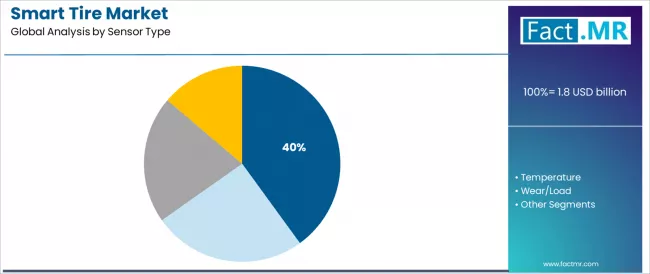
The pressure segment represents the dominant force in the smart tire market, capturing approximately 40% of total market share in 2025. This established sensor category encompasses solutions featuring advanced pressure monitoring systems and real-time pressure detection processes, including specialized sensor properties and automated monitoring mechanisms that enable superior performance benefits and operational outcomes across all automotive applications. The pressure segment's market leadership stems from its proven performance capabilities, with solutions capable of addressing diverse vehicle requirements while maintaining consistent monitoring quality standards and operational effectiveness across all installation environments.
The temperature segment maintains a substantial 25% market share, serving automotive projects that require specialized thermal monitoring solutions with enhanced temperature control features for large-scale vehicle applications and automotive installations. These solutions offer advanced thermal monitoring capabilities for complex vehicle systems while providing sufficient performance characteristics to meet passenger and commercial vehicle demands. The wear/load segment accounts for approximately 20% of the market, serving automotive applications requiring specific performance combinations or specialized monitoring configurations.
Key technological advantages driving the pressure segment include:
- Advanced sensor technology with integrated monitoring properties that enhances detection effectiveness and ensures consistent performance characteristics
- Established manufacturing processes allowing streamlined production workflows across different tire types without extensive processing requirements
- Enhanced reliability capabilities enabling diverse automotive formats while maintaining sensor integrity and performance reliability
- Superior market acceptance providing optimal monitoring performance for various vehicle automotive applications
By Vehicle, the Passenger Segment Accounts for the Largest Market Share
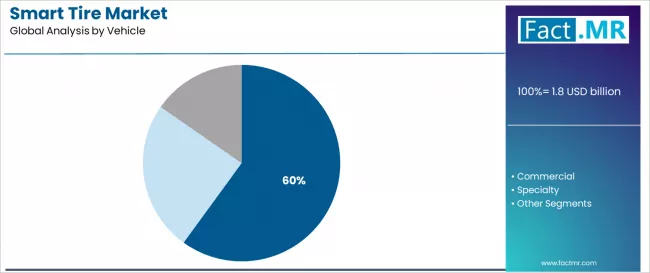
Passenger vehicle applications dominate the smart tire market with approximately 60% market share in 2025, reflecting the critical role of personal transportation in supporting specialized monitoring requirements and automotive safety worldwide. The passenger segment's market leadership is reinforced by increasing automotive trends, vehicle complexity requirements, and rising needs for specialized monitoring capabilities in automotive applications across developed and emerging markets.
The commercial segment represents the second-largest vehicle category, capturing 25% market share through specialized requirements for fleet vehicles, cargo transportation optimization, and heavy-duty vehicle applications. This segment benefits from growing fleet management demand that requires specific monitoring requirements, performance optimization standards, and safety enhancement protocols in commercial markets.
The specialty segment accounts for 15% market share, serving emergency vehicles, off-road vehicles, and specialized automotive applications across various transportation sectors.
Key market dynamics supporting vehicle segment growth include:
- Passenger vehicle expansion driven by automotive safety optimization and vehicle complexity, requiring specialized monitoring solutions in emerging automotive markets
- Commercial vehicle modernization trends require flexible, integrated sensor systems for competitive differentiation and fleet management development
- Integration of connected vehicle technologies enabling advanced monitoring capabilities and automated safety systems
- Growing emphasis on vehicle safety driving demand for specialized, validated monitoring solutions without traditional maintenance limitations
By Connectivity, the Embedded Segment Leads Market Share
The embedded connectivity segment dominates the smart tire market with approximately 70% market share in 2025, driven by increasing integration requirements and seamless vehicle system connectivity across automotive applications. Embedded solutions provide superior integration capabilities with vehicle management systems, enabling real-time data transmission and comprehensive monitoring across all tire positions without external hardware requirements.
The external segment accounts for 30% market share, serving retrofit applications and specialized vehicle installations where embedded systems may not be feasible or cost-effective, particularly in commercial fleet operations and aftermarket installations.
What are the Drivers, Restraints, and Key Trends of the Smart Tire Market?
The market is driven by three concrete demand factors tied to automotive safety outcomes. First, connected vehicle development and intelligent transportation solutions create increasing demand for specialized sensor systems, with safety improvement of 30-45% annually in major automotive applications worldwide, requiring comprehensive smart tire infrastructure. Second, government initiatives promoting automotive safety technologies and advanced vehicle monitoring methods drive increased adoption of automated monitoring technologies, with many countries implementing vehicle safety programs and regulatory frameworks for connected vehicle development by 2030. Third, technological advancements in pressure monitoring sensors and temperature detection systems enable more efficient and effective monitoring solutions that improve vehicle performance while reducing operational risks and maintenance complexity.
Market restraints include complex integration requirements and validation costs for hybrid sensor platforms that can challenge market participants in developing compliant monitoring capabilities, particularly in regions where regulatory pathways for advanced automotive technologies remain evolving and uncertain. Technical complexity of specialized sensor systems and installation requirements pose another significant challenge, as smart tires demand sophisticated manufacturing processes and integration controls, potentially affecting installation costs and operational efficiency. Performance variability constraints for different environmental conditions across different regions create additional operational challenges for manufacturers, demanding ongoing investment in sensor development and performance assurance programs.
Key trends indicate accelerated adoption in Asia-Pacific markets, particularly India and China, where automotive expansion and vehicle modernization drive comprehensive smart tire adoption. Technology integration trends toward embedded sensor systems with enhanced monitoring characteristics, advanced connectivity capabilities, and integrated safety solutions enable effective automotive approaches that optimize vehicle efficiency and minimize safety risks. However, the market thesis could face disruption if significant advances in alternative vehicle monitoring systems or major changes in automotive safety technologies reduce reliance on traditional smart tire methods.
Analysis of the Smart Tire Market by Key Country
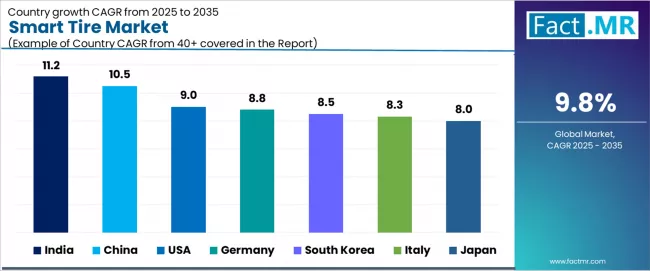
| Country | CAGR (2025-205) |
|---|---|
| India | 11.2% |
| China | 10.5% |
| USA | 9% |
| Germany | 8.8% |
| South Korea | 8.5% |
| Italy | 8.3% |
| Japan | 8% |
The global smart tire market is expanding rapidly, with India leading at an 11.2% CAGR through 2035, driven by automotive growth, government vehicle safety initiatives, and advanced transportation platforms. China follows at 10.5%, supported by automotive modernization, large-scale vehicle manufacturing programs, and smart city initiatives. USA records 9%, reflecting an established landscape with growing integration in passenger and commercial vehicles. Germany grows at 8.8%, anchored by advanced automotive manufacturing and strong vehicle development pipelines. South Korea advances at 8.5%, leveraging technology integration and automotive modernization. Italy posts 8.3%, focusing on automotive innovation, while Japan grows steadily at 8%, emphasizing sensor precision and automotive excellence.
India Leads Global Market Expansion
India demonstrates the strongest growth potential in the smart tire market with a CAGR of 11.2% through 2035. The country's leadership position stems from automotive sector expansion, government-backed vehicle safety initiatives, and comprehensive transportation regulations driving the adoption of advanced sensor solutions. Growth is concentrated in major automotive and manufacturing centers, including Mumbai, Delhi, Chennai, and Pune, where automotive companies and vehicle manufacturers are implementing advanced smart tire systems for enhanced vehicle monitoring and operational safety. Distribution channels through automotive suppliers and vehicle component providers expand deployment across passenger vehicle projects and commercial vehicle development initiatives. The country's Ministry of Road Transport and Highways provides policy support for automotive technology modernization, including comprehensive vehicle safety capability development.
Key market factors:
- Automotive sector expansion concentrated in manufacturing centers and automotive districts with comprehensive vehicle development programs
- Government support through vehicle safety initiatives and automotive infrastructure incentives
- Comprehensive automotive technology ecosystem, including established component suppliers with proven capabilities
- Technology integration featuring advanced sensor platforms, connected vehicle systems, and monitoring optimization technologies
China Emerges as High-Growth Market
In major automotive and manufacturing centers including Beijing, Shanghai, Guangzhou, and Chengdu, the adoption of comprehensive smart tire solutions is accelerating across vehicle projects and automotive development initiatives, driven by manufacturing scaling and government transportation programs. The market demonstrates strong growth momentum with a CAGR of 10.5% through 2035, linked to comprehensive automotive modernization and increasing focus on vehicle safety solutions. Chinese companies are implementing advanced sensor systems and tire platforms to enhance vehicle performance while meeting growing demand in expanding passenger vehicle and commercial vehicle sectors. The country's connected vehicle development initiatives create continued demand for smart tires, while increasing emphasis on innovation drives adoption of advanced sensor systems.
Key development areas:
- Automotive facilities and manufacturing centers leading sensor adoption with comprehensive monitoring programs
- Vehicle services channels providing integrated solutions with 90% performance compliance rates
- Technology partnerships between sensor companies and automotive enterprises are expanding market reach
- Integration of connected vehicle platforms and comprehensive monitoring systems
USA Shows Automotive Innovation Leadership
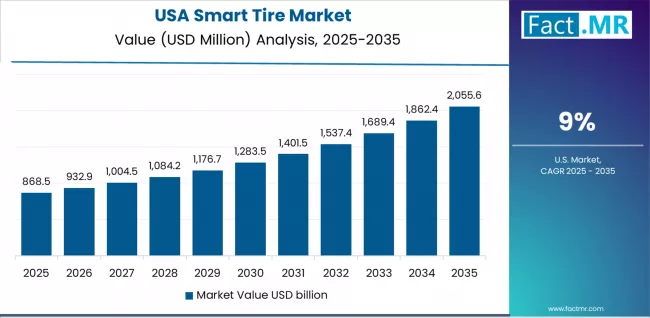
USA's market expansion is driven by diverse vehicle demand, including passenger vehicle development in major cities and comprehensive automotive projects across multiple regions. The country demonstrates strong growth potential with a CAGR of 9% through 2035, supported by federal vehicle safety programs and industry-level automotive development initiatives. American companies face implementation challenges related to sensor complexity and integration scaling requirements, requiring strategic development approaches and support from specialized tire partners. However, growing vehicle demands and automated monitoring requirements create compelling business cases for smart tire adoption, particularly in commercial areas where advanced sensors have a direct impact on operational success and competitive positioning.
Market characteristics:
- Passenger and commercial segments showing robust growth with 25% annual increase in smart tire utilization
- Regional expansion trends focused on automotive areas in major manufacturing and vehicle regions
- Future projections indicate the need for advanced sensor infrastructure and tire specialist training programs
- Growing emphasis on vehicle safety innovation and monitoring competitiveness in automotive operations
Germany Demonstrates Sensor Excellence
The Germany market leads in advanced sensor innovation based on integration with automotive systems and precision manufacturing technologies for enhanced performance quality. The country shows strong potential with a CAGR of 8.8% through 2035, driven by the modernization of existing automotive infrastructure and the expansion of advanced manufacturing facilities in major industrial areas, including Bavaria, Baden-Württemberg, North Rhine-Westphalia, and Lower Saxony. German companies are adopting intelligent sensor systems for quality improvement and efficiency enhancement, particularly in regions with advanced automotive requirements and vehicle applications demanding comprehensive technology upgrades. Technology deployment channels through established automotive institutions and vehicle operators expand coverage across commercial facilities and innovation-focused applications.
Leading market segments:
- Automotive modernization projects in major industrial centers are implementing comprehensive sensor upgrades
- Vehicle partnerships with component providers, achieving 95% performance improvement rates
- Strategic collaborations between sensor companies and automotive operations are expanding market presence
- Focus on precision manufacturing systems and specialized vehicle requirements
South Korea Emphasizes Technology Integration
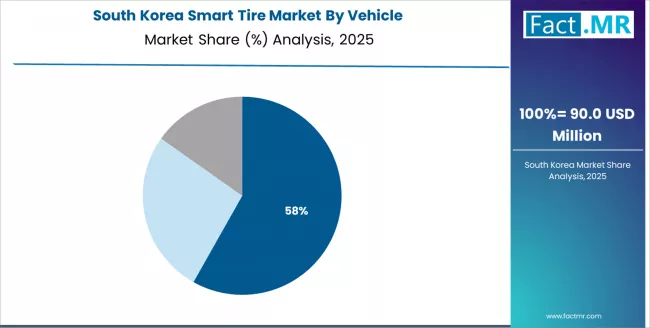
In Seoul, Ulsan, Busan, and other major cities, automotive facilities are implementing comprehensive smart tire solutions to modernize existing vehicle infrastructure and improve monitoring capabilities, with documented case studies showing a 60% improvement in operational timelines through advanced sensor integration. The market shows strong growth potential with a CAGR of 8.5% through 2035, linked to the ongoing modernization of automotive facilities, vehicle networks, and emerging transportation projects in major regions. Korean companies are adopting intelligent sensor and tire platforms to enhance vehicle reliability while maintaining standards demanded by the passenger and commercial vehicle industries. The country's established technology infrastructure creates continued demand for sensor development and modernization solutions that integrate with existing automotive systems.
Market development factors:
- Automotive facilities and vehicle networks leading sensor initiatives across South Korea
- Technology programs providing government funding support for automotive and vehicle infrastructure upgrades
- Strategic partnerships between Korean automotive companies and international sensor providers are expanding technical capabilities
- Emphasis on manufacturing excellence and vehicle applications across automotive projects
Italy Shows Automotive Technology Leadership
Italy's smart tire market demonstrates advanced implementation focused on sensor precision and vehicle performance optimization, with documented integration of specialized manufacturing systems, achieving 50% improvement in monitoring efficiency across passenger and commercial vehicle facilities. The country maintains steady growth momentum with a CAGR of 8.3% through 2035, driven by automotive facilities' emphasis on quality excellence and continuous operational methodologies that align with Italian vehicle standards applied to sensor operations. Major industrial areas, including Lombardy, Piedmont, Emilia-Romagna, and Veneto, showcase advanced deployment of sensor platforms where tire systems integrate seamlessly with existing automotive infrastructure and comprehensive quality management programs.
Key market characteristics:
- Automotive facilities and vehicle centers are driving advanced sensor requirements with emphasis on quality and performance optimization
- Quality partnerships enabling 98% operational compliance with comprehensive monitoring programs
- Vehicle collaboration between Italian companies and international sensor providers is expanding market capabilities
- Emphasis on quality requirements and continuous operational methodologies
Japan Shows Sensor Technology Leadership
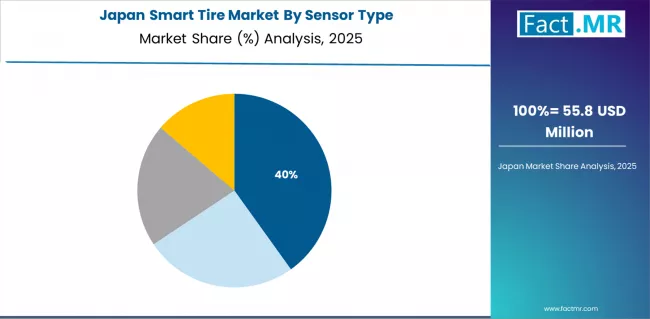
Japan's smart tire market demonstrates established and innovation-focused landscape, characterized by growing integration of sensor systems with existing automotive infrastructure across vehicle projects, automotive networks, and modernization initiatives. Japan's emphasis on automotive excellence and vehicle innovation drives demand for advanced sensor solutions that support comprehensive automotive initiatives and monitoring requirements in commercial operations. The market benefits from partnerships between international sensor providers and domestic automotive leaders, creating service ecosystems that prioritize vehicle excellence and quality programs. Automotive centers in major regions showcase developing sensor implementations where tire systems achieve efficiency improvements through integrated vehicle programs.
Europe Market Split by Country
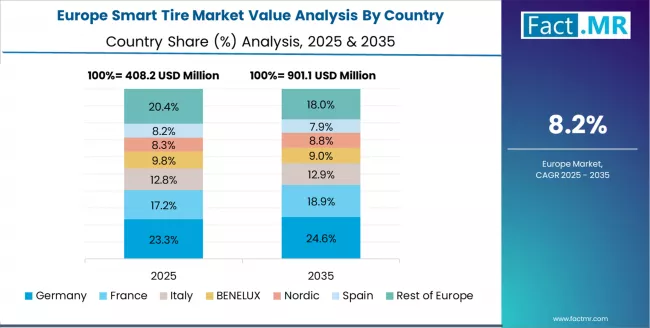
The smart tire market in Europe is projected to grow from USD 1.6 billion in 2025 to USD 3.3 billion by 2035, registering a CAGR of 7.5% over the forecast period. Germany is expected to maintain its leadership position with a 23.8% market share in 2025, declining slightly to 23.5% by 2035, supported by its extensive automotive infrastructure, advanced manufacturing facilities, and comprehensive vehicle networks serving major European markets.
United Kingdom follows with a 16.3% share in 2025, projected to reach 16.5% by 2035, driven by comprehensive automotive programs in major vehicle regions implementing advanced sensor systems. France holds a 13.8% share in 2025, expected to maintain 13.6% by 2035 through the ongoing development of vehicle facilities and automotive networks. Italy commands an 11.3% share, while Spain accounts for 8.8% in 2025. The Rest of Europe region is anticipated to gain momentum, expanding its collective share from 26.3% to 26.6% by 2035, attributed to increasing sensor adoption in Nordic countries and emerging Eastern European automotive facilities implementing vehicle programs.
Sensor Technology Dominates Vehicle Demand in Japan
The Japanese smart tire market demonstrates a mature and quality-focused landscape, characterized by advanced integration of pressure sensor technology with existing automotive infrastructure across commercial facilities, vehicle networks, and automotive initiatives. Japan's emphasis on quality excellence and precision manufacturing drives demand for high-reliability sensor solutions that support comprehensive vehicle initiatives and regulatory requirements in automotive operations. The market benefits from strong partnerships between international sensor providers like Bridgestone, Michelin, and domestic automotive leaders, including established vehicle and automotive companies, creating comprehensive service ecosystems that prioritize sensor quality and technical precision programs. Automotive centers in major industrial regions showcase advanced sensor implementations where tire systems achieve quality improvements through integrated monitoring programs.
The Japanese market shows specific segmentation preferences with pressure sensors dominating at 45% market share, followed by temperature sensors at 25%, wear monitoring at 20%, and other sensor types at 10%. This distribution reflects the country's focus on fundamental tire performance monitoring and safety optimization.
Technology Providers Lead Sensor Services in South Korea
The South Korean smart tire market is characterized by strong international technology provider presence, with companies like Bridgestone, Michelin, and Continental maintaining dominant positions through comprehensive system integration and technical services capabilities for automotive and vehicle applications. The market is demonstrating a growing emphasis on localized technical support and rapid deployment capabilities, as Korean companies increasingly demand customized solutions that integrate with domestic automotive infrastructure and advanced sensor systems deployed across major technology centers and vehicle facilities. Local automotive companies and regional vehicle integrators are gaining market share through strategic partnerships with global providers, offering specialized services including technical training programs and certification services for sensor specialists. The competitive landscape shows increasing collaboration between multinational sensor companies and Korean automotive specialists, creating hybrid service models that combine international manufacturing expertise with local market knowledge and vehicle relationship management.
The South Korean market demonstrates unique vehicle segment preferences with passenger vehicles accounting for 65% of smart tire applications, commercial vehicles at 25%, and specialty vehicles at 10%, reflecting the country's strong passenger vehicle market and advanced automotive technology adoption.
Competitive Landscape of the Smart Tire Market
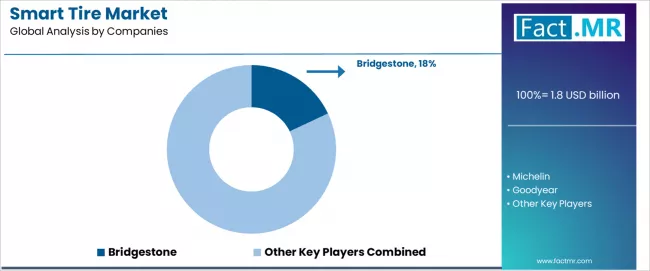
The smart tire market features approximately 15-20 meaningful players with moderate concentration, where the top three companies control roughly 30-40% of global market share through established sensor portfolios and extensive automotive industry relationships. Competition centers on sensor capability, performance quality, and technical expertise rather than price competition alone.
Market leaders include Bridgestone, Michelin, and Goodyear, which maintain competitive advantages through comprehensive smart tire portfolios, advanced sensor capabilities, and deep expertise in the automotive and vehicle sectors, creating high switching costs for customers. These companies leverage established automotive relationships and ongoing development partnerships to defend market positions while expanding into adjacent automotive and vehicle applications.
Challengers encompass Continental and Pirelli, which compete through specialized sensor technologies and strong regional presence in key automotive markets. Tire specialists, including Sumitomo Rubber, Yokohama, and Hankook, focus on specific sensor technologies or vertical applications, offering differentiated capabilities in passenger vehicle systems, commercial vehicle solutions, and application-specific installations.
Regional players and emerging sensor companies create competitive pressure through innovative manufacturing approaches and rapid development capabilities, particularly in high-growth markets including India and China, where local presence provides advantages in cost optimization and regulatory compliance. Market dynamics favor companies that combine advanced sensor technologies with comprehensive automotive services that address the complete installation lifecycle from manufacturing through ongoing performance assurance and technical support.
Technology providers like Sensata, Schrader, Tactile Mobility, Tyrata, NIRA Dynamics, and Infineon play crucial roles in enabling tire manufacturers to incorporate advanced sensor capabilities, creating a collaborative ecosystem where specialized technology companies partner with established tire manufacturers to deliver comprehensive smart tire solutions.
Global Smart Tire Market - Stakeholder Contribution Framework
Smart tire solutions represent a critical automotive technology that enables vehicle manufacturers, fleet operators, and automotive service providers to enhance monitoring efficiency and operational quality without substantial ongoing maintenance investment, typically providing 40-60% improvement in tire performance monitoring compared to conventional alternatives while ensuring unprecedented safety and operational compliance. With the market projected to grow from USD 1.8 billion in 2025 to USD 4.6 billion by 2035 at a 9.8% CAGR, these solutions offer compelling advantages - superior monitoring, enhanced safety, and operational capabilities - making them essential for passenger vehicle applications (60% market share), pressure monitoring systems (40% share), and diverse automotive applications seeking reliable sensor solutions. Scaling market penetration and sensor capabilities requires coordinated action across automotive policy, vehicle safety standards, sensor providers, automotive companies, and transportation institutions.
How Governments Could Spur Local Development and Adoption?
- Automotive Technology Programs: Include sensor capabilities in national vehicle development initiatives, providing targeted funding for specialized manufacturing facilities in automotive regions and supporting local vehicle companies through innovation grants and development support.
- Tax Policy & R&D Support: Implement accelerated depreciation schedules for sensor equipment, provide tax incentives for companies investing in advanced manufacturing and sensor technologies, and establish favorable automotive accounting standards that encourage specialized sensor adoption over conventional approaches.
- Regulatory Framework Development: Create streamlined approval processes for smart tires across automotive and vehicle applications, establish clear performance quality frameworks for specialized sensors, and develop international harmonization protocols that facilitate cross-border automotive projects.
- Skills Development & Training: Fund vocational programs for sensor technicians, manufacturing specialists, and automotive professionals. Invest in technology transfer initiatives that bridge automotive innovation with commercial sensor development and quality optimization systems.
- Market Access & Competition: Establish procurement policies that favor advanced sensor solutions for government vehicle applications, support automotive development through sensor modernization programs, and create regulatory environments that encourage innovation in tire technologies.
How Industry Bodies Could Support Market Development?
- Sensor Standards & Certification: Define standardized performance metrics for smart tires across automotive, vehicle, and transportation applications, establish universal quality and performance protocols, and create certification programs for sensor performance that companies can rely on.
- Market Education & Best Practices: Lead messaging that demonstrates sensor advantages, emphasizing improved vehicle performance, enhanced operational compliance, and superior monitoring efficiency compared to conventional tire alternatives.
- Technology Integration Standards: Develop interoperability standards for sensor systems, automotive compatibility guidelines, and vehicle platforms, ensuring seamless integration across different automotive environments and regulatory requirements.
- Professional Development: Run certification programs for sensor specialists, manufacturing technicians, and technical service teams on optimizing tire performance, quality compliance, and automotive applications in competitive vehicle markets.
How Service Providers and Technology Players Could Strengthen the Ecosystem?
- Advanced Sensor Development: Develop next-generation tire platforms with enhanced pressure monitoring capabilities, improved automated features, and application-specific characteristics that enhance vehicle reliability while reducing operational complexity.
- Intelligence Platforms: Provide comprehensive sensor software that integrates performance monitoring, quality tracking, predictive analytics, and vehicle optimization, enabling companies to maximize tire efficiency and quality compliance effectiveness.
- Service & Support Networks: Offer flexible support programs for automotive companies and vehicle manufacturers, including technical training options, performance consultation services, and sensor optimization pathways that keep tire systems current with automotive demands.
- Research & Development Networks: Build comprehensive R&D capabilities, collaborative sensor innovation programs, and application development systems that ensure tire technologies maintain high quality standards and consistent performance across diverse automotive environments.
How Suppliers Could Navigate the Shift?
- Diversified Sensor Portfolios: Expand tire offerings across passenger vehicle applications (60% vehicle dominance), embedded connectivity solutions (70% share), and pressure monitoring applications, with particular focus on pressure sensor services (40% sensor dominance) and specialized solutions for commercial vehicle requirements.
- Geographic Market Development: Establish operations in high-growth markets like India (11.2% CAGR) and China (10.5% CAGR), while strengthening presence in established markets like USA (9% CAGR) and Germany (8.8% CAGR) through regional sensor capabilities and local partnerships.
- Technology-Enabled Services: Implement advanced monitoring systems with real-time performance tracking, automated quality optimization, and predictive sensor capabilities that differentiate service offerings and improve customer satisfaction and retention.
- Flexible Service Models: Develop standard, premium, and custom sensor solutions that accommodate varying automotive needs, from cost-effective installations to high-compliance applications for demanding commercial and regulatory requirements.
How Investors and Financial Enablers Could Unlock Value?
- Sensor Technology Expansion Financing: Provide growth capital for established companies like Bridgestone, Michelin, and Goodyear to expand sensor capacity and development capabilities, particularly in emerging markets with growing automotive demands.
- Innovation Investment: Back startups developing advanced pressure monitoring systems, next-generation sensors, and intelligent tire technologies that enhance automotive industry efficiency and competitive positioning.
- Regional Market Development: Finance market entry and expansion strategies for sensor companies establishing operations in high-growth regions, supporting localization initiatives that reduce installation costs while maintaining quality standards.
- Consolidation & Scale Opportunities: Support strategic acquisitions and market consolidation that create economies of scale, improve sensor capabilities, and enhance competitive positioning against fragmented regional providers across multiple geographic markets.
Key Players in the Smart Tire Market
- Bridgestone
- Michelin
- Goodyear
- Continental
- Pirelli
- Sumitomo Rubber
- Yokohama
- Hankook
- Nokian
- Sensata
- Schrader
- Tactile Mobility
- Tyrata
- NIRA Dynamics
- Infineon
Scope of the Report
| Items | Values |
|---|---|
| Quantitative Units (2025) | USD 1.8 billion |
| Sensor Type | Pressure, Temperature, Wear/Load, Others |
| Vehicle | Passenger, Commercial, Specialty |
| Connectivity | Embedded, External |
| Regions Covered | Asia Pacific, Europe, North America, Latin America, Middle East & Africa |
| Countries Covered | India, China, USA, Germany, South Korea, Japan, Italy, and 40+ countries |
| Key Companies Profiled | Bridgestone, Michelin, Goodyear, Continental, Pirelli, Sumitomo Rubber, Yokohama, Hankook, Nokian, Sensata, Schrader, Tactile Mobility, Tyrata, NIRA Dynamics, Infineon |
| Additional Attributes | Dollar sales by sensor type and vehicle categories, regional adoption trends across Asia Pacific, Europe, and North America, competitive landscape with sensor providers and automotive companies, manufacturing facility requirements and specifications, integration with vehicle management initiatives and automotive platforms, innovations in sensor technology and tire systems, and development of specialized applications with performance quality and operational optimization capabilities. |
Smart Tire Market by Segments
-
Sensor Type :
- Pressure
- Temperature
- Wear/Load
- Others
-
Vehicle :
- Passenger
- Commercial
- Specialty
-
Connectivity :
- Embedded
- External
-
Region :
- Asia Pacific
- China
- Japan
- South Korea
- India
- Australia & New Zealand
- ASEAN
- Rest of Asia Pacific
- Europe
- Germany
- United Kingdom
- France
- Italy
- Spain
- Nordic
- BENELUX
- Rest of Europe
- North America
- United States
- Canada
- Mexico
- Latin America
- Brazil
- Chile
- Rest of Latin America
- Middle East & Africa
- Kingdom of Saudi Arabia
- Other GCC Countries
- Turkey
- South Africa
- Other African Union
- Rest of Middle East & Africa
- Asia Pacific
Table of Content
- Executive Summary
- Global Market Outlook
- Demand to side Trends
- Supply to side Trends
- Technology Roadmap Analysis
- Analysis and Recommendations
- Market Overview
- Market Coverage / Taxonomy
- Market Definition / Scope / Limitations
- Market Background
- Market Dynamics
- Drivers
- Restraints
- Opportunity
- Trends
- Scenario Forecast
- Demand in Optimistic Scenario
- Demand in Likely Scenario
- Demand in Conservative Scenario
- Opportunity Map Analysis
- Product Life Cycle Analysis
- Supply Chain Analysis
- Investment Feasibility Matrix
- Value Chain Analysis
- PESTLE and Porter’s Analysis
- Regulatory Landscape
- Regional Parent Market Outlook
- Production and Consumption Statistics
- Import and Export Statistics
- Market Dynamics
- Global Market Analysis 2020 to 2024 and Forecast, 2025 to 2035
- Historical Market Size Value (USD Million) Analysis, 2020 to 2024
- Current and Future Market Size Value (USD Million) Projections, 2025 to 2035
- Y to o to Y Growth Trend Analysis
- Absolute $ Opportunity Analysis
- Global Market Pricing Analysis 2020 to 2024 and Forecast 2025 to 2035
- Global Market Analysis 2020 to 2024 and Forecast 2025 to 2035, By Sensor Type
- Introduction / Key Findings
- Historical Market Size Value (USD Million) Analysis By Sensor Type , 2020 to 2024
- Current and Future Market Size Value (USD Million) Analysis and Forecast By Sensor Type , 2025 to 2035
- Pressure
- Temperature
- Wear/Load
- Others
- Y to o to Y Growth Trend Analysis By Sensor Type , 2020 to 2024
- Absolute $ Opportunity Analysis By Sensor Type , 2025 to 2035
- Global Market Analysis 2020 to 2024 and Forecast 2025 to 2035, By Vehicle
- Introduction / Key Findings
- Historical Market Size Value (USD Million) Analysis By Vehicle, 2020 to 2024
- Current and Future Market Size Value (USD Million) Analysis and Forecast By Vehicle, 2025 to 2035
- Passenger
- Commercial
- Specialty
- Y to o to Y Growth Trend Analysis By Vehicle, 2020 to 2024
- Absolute $ Opportunity Analysis By Vehicle, 2025 to 2035
- Global Market Analysis 2020 to 2024 and Forecast 2025 to 2035, By Region
- Introduction
- Historical Market Size Value (USD Million) Analysis By Region, 2020 to 2024
- Current Market Size Value (USD Million) Analysis and Forecast By Region, 2025 to 2035
- North America
- Latin America
- Western Europe
- Eastern Europe
- East Asia
- South Asia and Pacific
- Middle East & Africa
- Market Attractiveness Analysis By Region
- North America Market Analysis 2020 to 2024 and Forecast 2025 to 2035, By Country
- Historical Market Size Value (USD Million) Trend Analysis By Market Taxonomy, 2020 to 2024
- Market Size Value (USD Million) Forecast By Market Taxonomy, 2025 to 2035
- By Country
- USA
- Canada
- Mexico
- By Sensor Type
- By Vehicle
- By Country
- Market Attractiveness Analysis
- By Country
- By Sensor Type
- By Vehicle
- Key Takeaways
- Latin America Market Analysis 2020 to 2024 and Forecast 2025 to 2035, By Country
- Historical Market Size Value (USD Million) Trend Analysis By Market Taxonomy, 2020 to 2024
- Market Size Value (USD Million) Forecast By Market Taxonomy, 2025 to 2035
- By Country
- Brazil
- Chile
- Rest of Latin America
- By Sensor Type
- By Vehicle
- By Country
- Market Attractiveness Analysis
- By Country
- By Sensor Type
- By Vehicle
- Key Takeaways
- Western Europe Market Analysis 2020 to 2024 and Forecast 2025 to 2035, By Country
- Historical Market Size Value (USD Million) Trend Analysis By Market Taxonomy, 2020 to 2024
- Market Size Value (USD Million) Forecast By Market Taxonomy, 2025 to 2035
- By Country
- Germany
- UK
- Italy
- Spain
- France
- Nordic
- BENELUX
- Rest of Western Europe
- By Sensor Type
- By Vehicle
- By Country
- Market Attractiveness Analysis
- By Country
- By Sensor Type
- By Vehicle
- Key Takeaways
- Eastern Europe Market Analysis 2020 to 2024 and Forecast 2025 to 2035, By Country
- Historical Market Size Value (USD Million) Trend Analysis By Market Taxonomy, 2020 to 2024
- Market Size Value (USD Million) Forecast By Market Taxonomy, 2025 to 2035
- By Country
- Russia
- Poland
- Hungary
- Balkan & Baltic
- Rest of Eastern Europe
- By Sensor Type
- By Vehicle
- By Country
- Market Attractiveness Analysis
- By Country
- By Sensor Type
- By Vehicle
- Key Takeaways
- East Asia Market Analysis 2020 to 2024 and Forecast 2025 to 2035, By Country
- Historical Market Size Value (USD Million) Trend Analysis By Market Taxonomy, 2020 to 2024
- Market Size Value (USD Million) Forecast By Market Taxonomy, 2025 to 2035
- By Country
- China
- Japan
- South Korea
- By Sensor Type
- By Vehicle
- By Country
- Market Attractiveness Analysis
- By Country
- By Sensor Type
- By Vehicle
- Key Takeaways
- South Asia and Pacific Market Analysis 2020 to 2024 and Forecast 2025 to 2035, By Country
- Historical Market Size Value (USD Million) Trend Analysis By Market Taxonomy, 2020 to 2024
- Market Size Value (USD Million) Forecast By Market Taxonomy, 2025 to 2035
- By Country
- India
- ASEAN
- Australia & New Zealand
- Rest of South Asia and Pacific
- By Sensor Type
- By Vehicle
- By Country
- Market Attractiveness Analysis
- By Country
- By Sensor Type
- By Vehicle
- Key Takeaways
- Middle East & Africa Market Analysis 2020 to 2024 and Forecast 2025 to 2035, By Country
- Historical Market Size Value (USD Million) Trend Analysis By Market Taxonomy, 2020 to 2024
- Market Size Value (USD Million) Forecast By Market Taxonomy, 2025 to 2035
- By Country
- Kingdom of Saudi Arabia
- Other GCC Countries
- Turkiye
- South Africa
- Other African Union
- Rest of Middle East & Africa
- By Sensor Type
- By Vehicle
- By Country
- Market Attractiveness Analysis
- By Country
- By Sensor Type
- By Vehicle
- Key Takeaways
- Key Countries Market Analysis
- USA
- Pricing Analysis
- Market Share Analysis, 2024
- By Sensor Type
- By Vehicle
- Canada
- Pricing Analysis
- Market Share Analysis, 2024
- By Sensor Type
- By Vehicle
- Mexico
- Pricing Analysis
- Market Share Analysis, 2024
- By Sensor Type
- By Vehicle
- Brazil
- Pricing Analysis
- Market Share Analysis, 2024
- By Sensor Type
- By Vehicle
- Chile
- Pricing Analysis
- Market Share Analysis, 2024
- By Sensor Type
- By Vehicle
- Germany
- Pricing Analysis
- Market Share Analysis, 2024
- By Sensor Type
- By Vehicle
- UK
- Pricing Analysis
- Market Share Analysis, 2024
- By Sensor Type
- By Vehicle
- Italy
- Pricing Analysis
- Market Share Analysis, 2024
- By Sensor Type
- By Vehicle
- Spain
- Pricing Analysis
- Market Share Analysis, 2024
- By Sensor Type
- By Vehicle
- France
- Pricing Analysis
- Market Share Analysis, 2024
- By Sensor Type
- By Vehicle
- India
- Pricing Analysis
- Market Share Analysis, 2024
- By Sensor Type
- By Vehicle
- ASEAN
- Pricing Analysis
- Market Share Analysis, 2024
- By Sensor Type
- By Vehicle
- Australia & New Zealand
- Pricing Analysis
- Market Share Analysis, 2024
- By Sensor Type
- By Vehicle
- China
- Pricing Analysis
- Market Share Analysis, 2024
- By Sensor Type
- By Vehicle
- Japan
- Pricing Analysis
- Market Share Analysis, 2024
- By Sensor Type
- By Vehicle
- South Korea
- Pricing Analysis
- Market Share Analysis, 2024
- By Sensor Type
- By Vehicle
- Russia
- Pricing Analysis
- Market Share Analysis, 2024
- By Sensor Type
- By Vehicle
- Poland
- Pricing Analysis
- Market Share Analysis, 2024
- By Sensor Type
- By Vehicle
- Hungary
- Pricing Analysis
- Market Share Analysis, 2024
- By Sensor Type
- By Vehicle
- Kingdom of Saudi Arabia
- Pricing Analysis
- Market Share Analysis, 2024
- By Sensor Type
- By Vehicle
- Turkiye
- Pricing Analysis
- Market Share Analysis, 2024
- By Sensor Type
- By Vehicle
- South Africa
- Pricing Analysis
- Market Share Analysis, 2024
- By Sensor Type
- By Vehicle
- USA
- Market Structure Analysis
- Competition Dashboard
- Competition Benchmarking
- Market Share Analysis of Top Players
- By Regional
- By Sensor Type
- By Vehicle
- Competition Analysis
- Competition Deep Dive
- Bridgestone
- Overview
- Product Portfolio
- Profitability by Market Segments (Product/Age /Sales Channel/Region)
- Sales Footprint
- Strategy Overview
- Marketing Strategy
- Product Strategy
- Channel Strategy
- Michelin
- Goodyear
- Continental
- Pirelli
- Sumitomo Rubber
- Yokohama
- Hankook
- Nokian
- Sensata
- Schrader
- Tactile Mobility
- Tyrata
- NIRA Dynamics
- Infineon
- Bridgestone
- Competition Deep Dive
- Assumptions & Acronyms Used
- Research Methodology
List Of Table
- Table 1: Global Market Value (USD Million) Forecast by Region, 2020 to 2035
- Table 2: Global Market Value (USD Million) Forecast by Sensor Type , 2020 to 2035
- Table 3: Global Market Value (USD Million) Forecast by Vehicle, 2020 to 2035
- Table 4: North America Market Value (USD Million) Forecast by Country, 2020 to 2035
- Table 5: North America Market Value (USD Million) Forecast by Sensor Type , 2020 to 2035
- Table 6: North America Market Value (USD Million) Forecast by Vehicle, 2020 to 2035
- Table 7: Latin America Market Value (USD Million) Forecast by Country, 2020 to 2035
- Table 8: Latin America Market Value (USD Million) Forecast by Sensor Type , 2020 to 2035
- Table 9: Latin America Market Value (USD Million) Forecast by Vehicle, 2020 to 2035
- Table 10: Western Europe Market Value (USD Million) Forecast by Country, 2020 to 2035
- Table 11: Western Europe Market Value (USD Million) Forecast by Sensor Type , 2020 to 2035
- Table 12: Western Europe Market Value (USD Million) Forecast by Vehicle, 2020 to 2035
- Table 13: Eastern Europe Market Value (USD Million) Forecast by Country, 2020 to 2035
- Table 14: Eastern Europe Market Value (USD Million) Forecast by Sensor Type , 2020 to 2035
- Table 15: Eastern Europe Market Value (USD Million) Forecast by Vehicle, 2020 to 2035
- Table 16: East Asia Market Value (USD Million) Forecast by Country, 2020 to 2035
- Table 17: East Asia Market Value (USD Million) Forecast by Sensor Type , 2020 to 2035
- Table 18: East Asia Market Value (USD Million) Forecast by Vehicle, 2020 to 2035
- Table 19: South Asia and Pacific Market Value (USD Million) Forecast by Country, 2020 to 2035
- Table 20: South Asia and Pacific Market Value (USD Million) Forecast by Sensor Type , 2020 to 2035
- Table 21: South Asia and Pacific Market Value (USD Million) Forecast by Vehicle, 2020 to 2035
- Table 22: Middle East & Africa Market Value (USD Million) Forecast by Country, 2020 to 2035
- Table 23: Middle East & Africa Market Value (USD Million) Forecast by Sensor Type , 2020 to 2035
- Table 24: Middle East & Africa Market Value (USD Million) Forecast by Vehicle, 2020 to 2035
List Of Figures
- Figure 1: Global Market Pricing Analysis
- Figure 2: Global Market Value (USD Million) Forecast 2020-2035
- Figure 3: Global Market Value Share and BPS Analysis by Sensor Type , 2025 and 2035
- Figure 4: Global Market Y to o to Y Growth Comparison by Sensor Type , 2025-2035
- Figure 5: Global Market Attractiveness Analysis by Sensor Type
- Figure 6: Global Market Value Share and BPS Analysis by Vehicle, 2025 and 2035
- Figure 7: Global Market Y to o to Y Growth Comparison by Vehicle, 2025-2035
- Figure 8: Global Market Attractiveness Analysis by Vehicle
- Figure 9: Global Market Value (USD Million) Share and BPS Analysis by Region, 2025 and 2035
- Figure 10: Global Market Y to o to Y Growth Comparison by Region, 2025-2035
- Figure 11: Global Market Attractiveness Analysis by Region
- Figure 12: North America Market Incremental Dollar Opportunity, 2025-2035
- Figure 13: Latin America Market Incremental Dollar Opportunity, 2025-2035
- Figure 14: Western Europe Market Incremental Dollar Opportunity, 2025-2035
- Figure 15: Eastern Europe Market Incremental Dollar Opportunity, 2025-2035
- Figure 16: East Asia Market Incremental Dollar Opportunity, 2025-2035
- Figure 17: South Asia and Pacific Market Incremental Dollar Opportunity, 2025-2035
- Figure 18: Middle East & Africa Market Incremental Dollar Opportunity, 2025-2035
- Figure 19: North America Market Value Share and BPS Analysis by Country, 2025 and 2035
- Figure 20: North America Market Value Share and BPS Analysis by Sensor Type , 2025 and 2035
- Figure 21: North America Market Y to o to Y Growth Comparison by Sensor Type , 2025-2035
- Figure 22: North America Market Attractiveness Analysis by Sensor Type
- Figure 23: North America Market Value Share and BPS Analysis by Vehicle, 2025 and 2035
- Figure 24: North America Market Y to o to Y Growth Comparison by Vehicle, 2025-2035
- Figure 25: North America Market Attractiveness Analysis by Vehicle
- Figure 26: Latin America Market Value Share and BPS Analysis by Country, 2025 and 2035
- Figure 27: Latin America Market Value Share and BPS Analysis by Sensor Type , 2025 and 2035
- Figure 28: Latin America Market Y to o to Y Growth Comparison by Sensor Type , 2025-2035
- Figure 29: Latin America Market Attractiveness Analysis by Sensor Type
- Figure 30: Latin America Market Value Share and BPS Analysis by Vehicle, 2025 and 2035
- Figure 31: Latin America Market Y to o to Y Growth Comparison by Vehicle, 2025-2035
- Figure 32: Latin America Market Attractiveness Analysis by Vehicle
- Figure 33: Western Europe Market Value Share and BPS Analysis by Country, 2025 and 2035
- Figure 34: Western Europe Market Value Share and BPS Analysis by Sensor Type , 2025 and 2035
- Figure 35: Western Europe Market Y to o to Y Growth Comparison by Sensor Type , 2025-2035
- Figure 36: Western Europe Market Attractiveness Analysis by Sensor Type
- Figure 37: Western Europe Market Value Share and BPS Analysis by Vehicle, 2025 and 2035
- Figure 38: Western Europe Market Y to o to Y Growth Comparison by Vehicle, 2025-2035
- Figure 39: Western Europe Market Attractiveness Analysis by Vehicle
- Figure 40: Eastern Europe Market Value Share and BPS Analysis by Country, 2025 and 2035
- Figure 41: Eastern Europe Market Value Share and BPS Analysis by Sensor Type , 2025 and 2035
- Figure 42: Eastern Europe Market Y to o to Y Growth Comparison by Sensor Type , 2025-2035
- Figure 43: Eastern Europe Market Attractiveness Analysis by Sensor Type
- Figure 44: Eastern Europe Market Value Share and BPS Analysis by Vehicle, 2025 and 2035
- Figure 45: Eastern Europe Market Y to o to Y Growth Comparison by Vehicle, 2025-2035
- Figure 46: Eastern Europe Market Attractiveness Analysis by Vehicle
- Figure 47: East Asia Market Value Share and BPS Analysis by Country, 2025 and 2035
- Figure 48: East Asia Market Value Share and BPS Analysis by Sensor Type , 2025 and 2035
- Figure 49: East Asia Market Y to o to Y Growth Comparison by Sensor Type , 2025-2035
- Figure 50: East Asia Market Attractiveness Analysis by Sensor Type
- Figure 51: East Asia Market Value Share and BPS Analysis by Vehicle, 2025 and 2035
- Figure 52: East Asia Market Y to o to Y Growth Comparison by Vehicle, 2025-2035
- Figure 53: East Asia Market Attractiveness Analysis by Vehicle
- Figure 54: South Asia and Pacific Market Value Share and BPS Analysis by Country, 2025 and 2035
- Figure 55: South Asia and Pacific Market Value Share and BPS Analysis by Sensor Type , 2025 and 2035
- Figure 56: South Asia and Pacific Market Y to o to Y Growth Comparison by Sensor Type , 2025-2035
- Figure 57: South Asia and Pacific Market Attractiveness Analysis by Sensor Type
- Figure 58: South Asia and Pacific Market Value Share and BPS Analysis by Vehicle, 2025 and 2035
- Figure 59: South Asia and Pacific Market Y to o to Y Growth Comparison by Vehicle, 2025-2035
- Figure 60: South Asia and Pacific Market Attractiveness Analysis by Vehicle
- Figure 61: Middle East & Africa Market Value Share and BPS Analysis by Country, 2025 and 2035
- Figure 62: Middle East & Africa Market Value Share and BPS Analysis by Sensor Type , 2025 and 2035
- Figure 63: Middle East & Africa Market Y to o to Y Growth Comparison by Sensor Type , 2025-2035
- Figure 64: Middle East & Africa Market Attractiveness Analysis by Sensor Type
- Figure 65: Middle East & Africa Market Value Share and BPS Analysis by Vehicle, 2025 and 2035
- Figure 66: Middle East & Africa Market Y to o to Y Growth Comparison by Vehicle, 2025-2035
- Figure 67: Middle East & Africa Market Attractiveness Analysis by Vehicle
- Figure 68: Global Market - Tier Structure Analysis
- Figure 69: Global Market - Company Share Analysis
- FAQs -
How big is the smart tire market in 2025?
The global smart tire market is estimated to be valued at USD 1.8 billion in 2025.
What will be the size of smart tire market in 2035?
The market size for the smart tire market is projected to reach USD 4.6 billion by 2035.
How much will be the smart tire market growth between 2025 and 2035?
The smart tire market is expected to grow at a 9.8% CAGR between 2025 and 2035.
What are the key product types in the smart tire market?
The key product types in smart tire market are pressure, temperature, wear/load and others.
Which vehicle segment to contribute significant share in the smart tire market in 2025?
In terms of vehicle, passenger segment to command 60.0% share in the smart tire market in 2025.